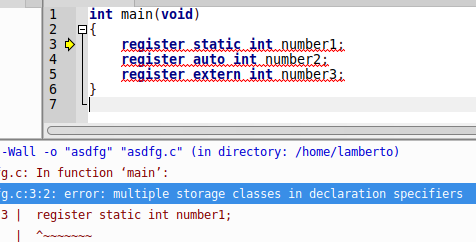How Do You Store Values In Register In C
- Home
- C Keywords
- register
C register keyword
In C register keyword suggests to the compiler that the electric current variable should be stored in a CPU register, rather than retentivity.
The idea
The central processor can hold a very modest amount of data. This data is stored in places called registers. Data saved there, is accessed faster than data stored in memory. For that reason programs can load their most-frequently accessed information in the CPU registers.
This is the very idea of the register keyword in C. Information technology tells the compiler that nosotros will work frequently with the current variable and it should be stored for fast access. Note that this is only a "hint" to the compiler and it could ignore it(and well-nigh likely it will, just more about this in a minute).
C register – instance in code
int values[5]; register int i; for(i = 0; i < 5; ++i) { values[i] = i; }
Restrictions
Register is a storage class specifier. We cannot utilize more than one storage class specifier for ane variable.
Attempting to assign more than than ane storage form specifier will effect in an error like " error: multiple storage classes in declaration specifiers "
This means that the post-obit declarations are not correct:

Placing a variable in a processor register means that information technology does not have a retentivity accost, because it is non in the retentivity. Therefore, in C, if yous declare a variable with the register keyword, you cannot access its address with the & operator.
Even if the variable is placed in retentivity, the compiler should not allow you to access its address. You lot can utilise this to make sure that some variable will not be inverse outside of its function.
The following code should not compile. In my case information technology returns a compile-time fault "error: address of register variable 'number' requested"
If it compiles, it should give a warning and chances are the program will crash.
1 two 3 4 5 half dozen 7 viii | int principal() { register int number = i; scanf("%d", &number); printf("%d", number); return 0; } |
If you use a C++ compiler : Many people are using C++ compilers to compile their C programs. This is OK, but it could crusade some confusion, because in C++ it is allowed to access the address of a annals variable.
Usage in practise
Inappreciably any.
Back in the days compilers were not very good at deciding when to apply machine registers for variables. For that reason the C developers did this manually with the register keyword.
With time the compilers got smarter. They became better than us in deciding near variables storage. Today information technology is very unlikely that a developer volition make a better conclusion about a register variable. In fact, most of the time you could just brand things slower. That'due south why many compilers will ever ignore the C register keyword when information technology comes to storage.
Even so, like nosotros said before, you lot tin utilize the C register keyword to brand sure your variable volition not be accessed by address and inverse outside of the scope that you expect.
Come across too:
- car
- extern
- static
- Home
- C Keywords
- register
How Do You Store Values In Register In C,
Source: https://www.c-programming-simple-steps.com/c-register.html
Posted by: schoenrockbety1981.blogspot.com


0 Response to "How Do You Store Values In Register In C"
Post a Comment